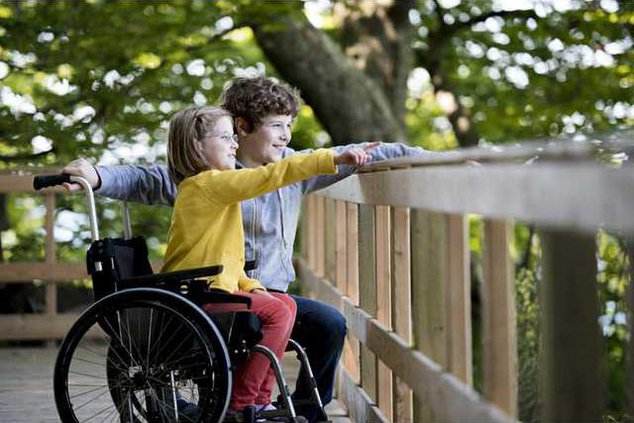On siblings… 4 real stories direct from our families

We spoke to our families about how they have gone about meeting the needs of all the children in the family. They key takeaway? It’s all about balance.
Heather
“I have 2 incredible kids 3 years apart. Erica my oldest is 9. Arianna, who has Sotos Syndrome, is 6. My youngest looks up to my oldest, always wanting to be just like her! She learns language and play skills from modelling her sister. During COVID, I really saw Arianna’s play skills expand as the kids spent more time together.
“In return, Erica has learnt so much about diversity and appreciating difference from her sister. She has grown up amongst the tube feeds, wheelchairs, and key word signs. She’ll often get excited if she sees people with a disability represented in the media. She is so proud of her sister.”
Stacey
“I have 3 children in my pack. Sammy is 11, Alex, who has Williams Syndrome, is 10 and Anneliese is 8. As Anneliese reached school age, I noticed she needed a bit more attention. So, I started a regular girls’ day out, where we take the day to do something special together. As a lot of the focus in our home can often be on Alex, we both enjoy not only this time together but the planning of it! Sometimes it won’t be an outing and we plan activities that we will do at home together, just the two of us. Her favourite is a pamper session where we paint our nails and wear face masks that we make ourselves from yoghurt! I make sure that Alex is busy during these times so the focus can be all on her.”
“When my kids were younger, I made a point of finding fun things we can do together as a unit to meet Alex’s therapy goals, that doesn’t actually feel like therapy. We often make trips to the $2 store to buy beads, string, pasta, marbles, and tongs, rather than therapy-specific items.”
“When talking to Sammy and Annelise, I’ve always been honest and transparent about Alex’s disability. I take time to explain how his brain works differently. That way, they better understand when he perhaps behaves in different ways, or isn’t held to the same standards of behaviour as they are. I am very open and talk about the great things that make my middle boy different, such as his great courage and confidence when talking to new people. I really make a point to normalise everything with them.”
Melo
“I’m a proud Dad to Yianni (12) and Victoria (10), who has a cognitive disability and a range of physical challenges. Like most younger siblings, Victoria loves her big brother so much, and she always wants his attention and seeks him out to play! Yianni has really helped us see Victoria’s potential. Often we might be doing things a particular way, and he is the one to let us know it’s time to challenge Victoria to do more, or give her more opportunities to demonstrate her skills. I also remember times I just didn’t know what Victoria was trying to say or explain to me, and as I struggled to work it out with her, his little voice would casually say “Dad, she wants… or, she is telling you about…”
As Yianni gets older, he is seeking independence from his sister a little more. I’ve found it’s important to remember that all sibling relationships are constantly changing. As parents busy supporting a child with disability, It’s important we don’t forget to make Yanni’s needs feel valued. I’ve heard other older siblings share honestly, that when they were growing up, having a sibling with a disability was not something they always embraced. Some even felt resentful at times. But when they were older, they came to appreciate their sibling more and more. Knowing that is encouraging for us as parents, especially because Victoria’s intellectual disability is such that she doesn’t realise she can be annoying to her 12 yo brother. You see, as we support Victoria’s needs, we have come to realise, we can’t lose sight of the fact no matter how helpful Yianni is, however mature he might be for a 12 yo, he is still only a 12 yo. So, we need to have family time doing things together, which is important to us, and also make sure we have one on one time too for Yianni, and Victoria.”
Racha
“I am mum to Sophie and her little sister Olivia, who has delays. The girls have such a loving bond. When Sophie was younger, I would point out how much love Olivia has for her. I’d say things like, “look how she stares at you when you play with her, with so much love in her eyes” or “See how she follows you around everywhere, she can’t get enough of you!” Sophie used to respond to this really well and it helped build their bond.
“It’s so important to me that Sophie recognises that she is just as valuable and special as her sister. One thing I really make sure of is that she doesn’t miss out on activities outside the family unit. Things like attending birthday parties, playdates, and participating in activities she loves. I’m actively involved in her school P&C and attend almost all school events, as I know this makes Sophie feel so special and proud.
I’ve found sibling groups can be really worthwhile, too. As we experience as adults, there is something special about connecting with someone who says, ‘I know what it is like’. Places like Siblings Australia often have great workshops for siblings of children with disability.”
Contact Siblings Australia for information about sibling support and their SibWorks peer support program for young siblings.